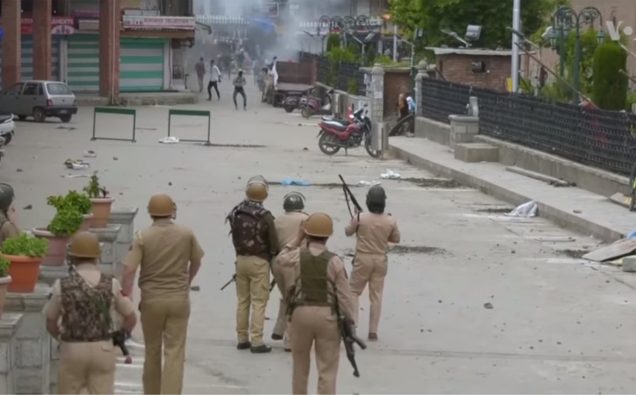
The United Nations ace human rights body is hitting back at India for its unfounded criticism of a blistering report documenting a number of incidents establishing New Delhi’s use of lethal force against Kashmiri people.
Pakistan has accepted the report while India has dismissed the first ever document detailing Indian atrocities like use of pellet guns and other dehumanizing tactics to quell Kashmiri’s voice for freedom from New Delhi’s rule.
Analysts in Pakistan say Indian often alleges a Pakistani hand behind Kashmir uprisings and now a detailed world body document has exposed its fake claims. Pakistan and India both claim Jammu and Kashmir and control parts of it, 71 years after the dispute exploded soon after 1947 independence from the British rule.
There is a widespread perception among experts in international circles that India wants to discredit the Kashmiris’ struggle by denying access to international observers and by equating the Kashmiri protests with terrorist violence.
The UN Secretary General Antonio Guterres has also backed the report compiled by the office of High Commissioner for Human Rights Zeid Ra’ad Al Hussein.
The report urged the Human Rights Council “to consider establishing a Commission of Inquiry [COI] to conduct a comprehensive independent international investigation into allegations of human rights violations in Indian occupied Kashmir.
The report is also critical of Pakistan on some human rights issues.
Following is the text of the statement released by the Spokesperson for the UN High Commissioner for Human Rights, Rupert Colville, in response to India’s campaign against the Kashmir report, issued in Geneva on 17 July 2018.
“Nefarious conspiracy”, “Pakistan-authored report”, “fallacious”, “mala fide” – these are some of the accusations levelled by numerous Indian media outlets against the UN Human Rights Office for our publication last month of the first-ever UN human rights report on Kashmir.
The report was developed through remote monitoring, after the Indian and Pakistani authorities failed to grant us unconditional access to the region. Since the report was published, we have been deeply disappointed by the reaction of the Indian authorities, who dismissed the report as “fallacious, tendentious and motivated” without examining it and responding to the very serious concerns about the human rights situation in Indian-administered Kashmir and Pakistan-administered Kashmir as laid out in the report.
In recent days, a surprising number of Indian media organizations have seized unquestioningly upon a claim by someone reported to be a Canada-based imam of Pakistani descent, named Zafar Bangash, that the High Commissioner was in constant contact with him, with the inference being that Mr Bangash influenced the content of the report. This is totally untrue. The High Commissioner has never spoken with Mr Bangash, and we are not aware of receiving any information from him, let alone using it, although it is possible he sent an email or letter and received a polite acknowledgment, as is the case with thousands of letters and emails sent to the Office of the High Commissioner for Human Rights.
In the face of this and numerous other misrepresentations of the report, we would like to set the facts straight.
The report contains 388 footnotes that detail all the sources that were used: these include official sources such as the Lok Sabha and Rajya Sabha – India’s parliament – as well as the Supreme Court of India, the Ministry of External Affairs, the Jammu and Kashmir Legislative Assembly, the Jammu and Kashmir State Human Rights Commission, the Union Ministry of Defence, the Chief of Army Staff and even a former Vice President. Accusations that we used unverified information are thus rather puzzling. The report also draws on reliable information from reputable civil society organizations and the Press Trust of India, and these are all clearly cited in the footnotes.
Some Indian media outlets have even gone so far as to claim that a photograph of the High Commissioner with three individuals from Pakistan-Administered Kashmir taken outside the Human Rights Council room in Geneva is – I quote — “clear proof of the ISI’s [Pakistan’s intelligence agency] involvement.” The unsupported conclusion that this photo indicates complicity is tendentious and – along with other such wild claims — appears designed to discredit the report while avoiding any real examination of, and reflection on, its contents. Individuals often ask to be photographed with the High Commissioner, and he often politely obliges.
We are disturbed by the sustained attempts to distract and divert the focus away from the human rights violations on both sides of the Line of Control. The UN Human Rights Office has a global mandate and works independently, with a well-established methodology, in its public reporting. Ultimately, our goal in drafting this report was to assist the States and others to identify and address human rights challenges and to give a voice to all Kashmiris who have been rendered voiceless amid the deep political polarization. This is not about politics. It is about the human rights of millions of people in Kashmir. And we will continue to try to engage with Indian and Pakistani authorities on this and other important human rights issues, and press for access to both Indian-administered Kashmir and Pakistan-administered Kashmir.”


















